Consumer Health Information Services and Programs
Consumer Health Information Services and Programs
Best Practices
Edited by M. Sandra Wood
Rowman & Littlefield
Lanham Boulder New York London
Published by Rowman & Littlefield
A wholly owned subsidiary of The Rowman & Littlefield Publishing Group, Inc.
4501 Forbes Boulevard, Suite 200, Lanham, Maryland 20706
www.rowman.com
Unit A, Whitacre Mews, 26-34 Stannary Street, London SE11 4AB
Copyright 2016 by Rowman & Littlefield
All rights reserved . No part of this book may be reproduced in any form or by any electronic or mechanical means, including information storage and retrieval systems, without written permission from the publisher, except by a reviewer who may quote passages in a review.
British Library Cataloguing in Publication Information Available
Library of Congress Cataloging-in-Publication Data
Names: Wood, M. Sandra, editor.
Title: Consumer health information services and programs : best practices / edited by M. Sandra Wood.
Description: Lanham : Rowman & Littlefield, [2016] | Series: Best practices in library services | Includes bibliographical references and index. | Description based on print version record and CIP data provided by publisher; resource not viewed.
Identifiers: LCCN 2015044028 (print) | LCCN 2015042629 (ebook) | ISBN 9781442262744 (electronic) | ISBN 9781442262720 (cloth : alk. paper) | ISBN 9781442262737 (pbk. : alk. paper)
Subjects: LCSH: MedicineInformation services. | HealthInformation services. | Public health libraries. | Health education.
Classification: LCC R118.2 (print) | LCC R118.2 .C65 2016 (ebook) | DDC 362.1dc23
LC record available at http://lccn.loc.gov/2015044028
 The paper used in this publication meets the minimum requirements of American National Standard for Information SciencesPermanence of Paper for Printed Library Materials, ANSI/NISO Z39.48-1992.
The paper used in this publication meets the minimum requirements of American National Standard for Information SciencesPermanence of Paper for Printed Library Materials, ANSI/NISO Z39.48-1992.
Printed in the United States of America
Preface
Health (and the health care industry) is in the news every day, from discoveries of new treatments for cancer, to fundraisers for diseases such as ALS (amyotrophic lateral sclerosis) or the Childrens Miracle Network, to locating genetic markers for Alzheimers, to almost daily discussion about the Affordable Care Act (Obamacare)the talk about health care and the need to locate health care information abounds. Health and health care affects everyone, men and women, old and young. Whether looking for information about a disease (symptoms, treatments, genetics, etc.) or needing help in applying for health insurance online or trying to locate a doctor, most people, at one time or another, will need help in finding health care-related information.
Health care topics are among the most heavily searched topics on the Internet. According to the Pew Internet Project (2015), 87 percent of adults in the United States use the Internet (January 2014 survey), and of those, 72% of internet users say they looked online for health information within the past year (2012 survey). Librarians must be prepared to offer programs and services to facilitate health information seeking by the general public or patients looking for health information for themselves or for those they care for. From public libraries to hospital and academic health sciences libraries, consumer health information (CHI) services have become a high priority.
The Medical Library Associations Consumer and Patient Health Information Section (CAPHIS) defines consumer health information as information on health and medical topics provided in response to requests from the general public, including patients and their families. In addition to information on the symptoms, diagnosis and treatment of disease, CHI encompasses information on health promotion, preventive medicine, the determinants of health and accessing the health care system (CAPHIS, 2013). The American Library Associations Reference & Users Services Association (RUSA) has developed guidelines that include provision of consumer health information, and the Medical Library Association offers a Consumer Health Information Specialization (https://www.mlanet.org/education/chc); the National Library of Medicine expanded its focus beginning in 1998 with the launch of the MedlinePlus consumer health website along with other products such as health assessment tools and MedlinePlus Connect. The interest in these organizations in consumer health information reflects the publics continued need for health information and the interest among both public and medical libraries in providing CHI to their constituents. Consumer Health Information Services and Programs: Best Practices offers advice and guidance for providing quality services and programs for all librarians who are looking to institute new programs or upgrade already existing services.
Organization of the Book
Consumer Health Information Services and Programs: Best Practices features nine chapters, each of which offers advice, lessons learned, and best practices for providing health information to the general public and patients, from planning and establishing a CHI program to offering specialized services to special populations. Chapter authors were selected to provide a variety of unique and contemporary approaches and include librarians from hospitals, academic health science centers, and public libraries.
In chapter 1, A Most ResourceFULL Consumer Health Information Center, Cara Marcus describes the services offered by the Patient/Family Resource Center (P/FRC) at Brigham and Womens Faulkner Hospital in Jamaica Plain, Massachusetts, which opened in 1999. The P/FRC provides reference services, Internet and wireless access, fax service, and free photocopying, and maintains a collection of resources that are fully vetted before being purchased. The library is open to anyone in the surrounding area. Marcus credits their success to customized, value-added service for each individual, quality resources, thoughtful analysis of organizational goals, and caring, friendly staff and volunteers.
Chapter 2, The University of Tennessee Medical Centers Preston Medical Library and Health Information Center Story, describes the librarys 1989 relocation and expansion, including the Consumer Health Information Service (CHIS). Sandy Oelschlegel, Martha Earl, and Kelsey Leonard document the development of the CHIS and emphasize best practices that include collaboration, assessment, outreach, staffing, collections, marketing, services, and research. Through funding from a grant, a new library was completed in 2014 that included the CHIS; a floor plan is included.
Health InfoNet of Alabama, begun in 1989, is a statewide, collaborative, free health information service for consumers comprised of the states medical and public libraries. Chapter 3, Health InfoNet of Alabama, by Kay Hogan Smith, describes the creation, organization, and implementation of this program, including services, funding, and marketing. Smith discusses survival post-Go Local (a program of the National Library of Medicine). Lessons learned include advice about funding, staffing, community outreach, and collaboration.
In chapter 4, Consumer Health Information Service in the Public Library, Barbara M. Bibel describes the role of the public library in providing consumer health services, including the importance of providing access to current, reliable resources online and in print and the need to teach patrons how to use these resources. Appendices include a list of resources for materials in non-English languages, the ALA Library Bill of Rights, the ALA Code of Ethics, and the Code of Ethics for Health Sciences Librarianship.
Deidra Woodson and Donna F. Timm describe how an academic health sciences library provides collaborative programming with local public libraries in chapter 5, Rewards and Challenges of Childrens Health Education: An Ongoing Community Partnership to Reach Local Preschoolers. Using grant money from their regional library, the LSU Health Shreveport Health Sciences Library partnered with public librarians to provide story-time programs on health-related topics such as diet and exercise for children in their area. Lessons learned included: be flexible, be prepared for the unexpected, and be resourceful and creative. The long-term relationship with public libraries has been rewarding on both sides. An appendix has an extensive list of books to use for story times.
Next page

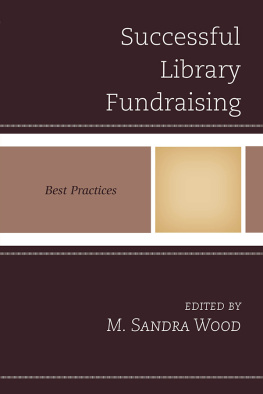
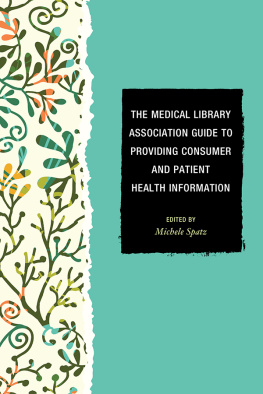
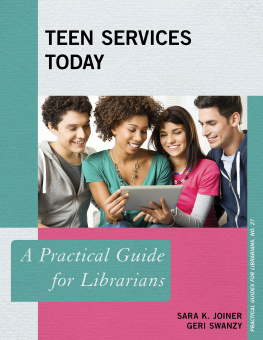

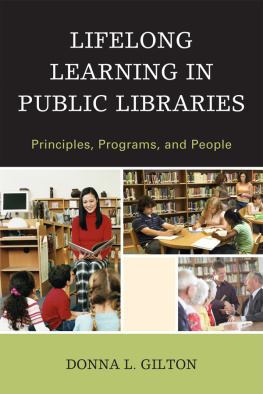
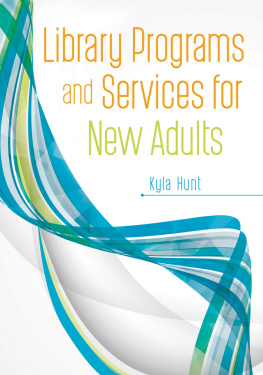
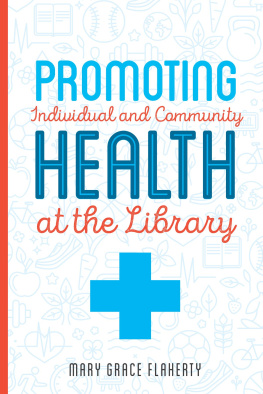

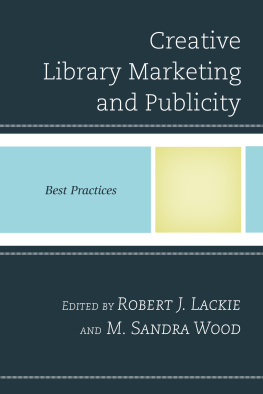

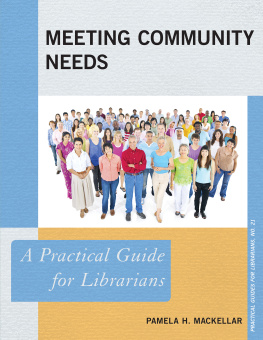
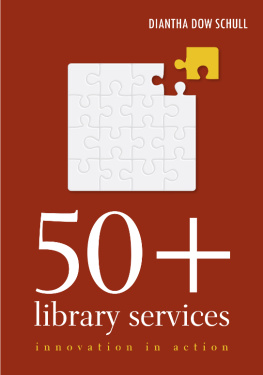
 The paper used in this publication meets the minimum requirements of American National Standard for Information SciencesPermanence of Paper for Printed Library Materials, ANSI/NISO Z39.48-1992.
The paper used in this publication meets the minimum requirements of American National Standard for Information SciencesPermanence of Paper for Printed Library Materials, ANSI/NISO Z39.48-1992.